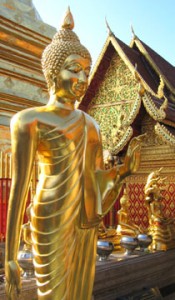 Nit from Udon Thani’s grandmother died this week, and the family is planning for the elaborate death ceremony that accompanies most Isaan deaths in upcountry Thailand. She tells us a little about the ritual, a fascinating one for anyone interested in Buddhism and death in Thailand.
Nit from Udon Thani’s grandmother died this week, and the family is planning for the elaborate death ceremony that accompanies most Isaan deaths in upcountry Thailand. She tells us a little about the ritual, a fascinating one for anyone interested in Buddhism and death in Thailand.
“They always cremate the body,” she says. They can burn the body on either the 3rd, 7th, or 100th day after the individual dies. She hasn’t ever seen anyone choose anything other than the 3 day interval, probably because no one in her village has access to the money or resources to put a body on ice for that long.
She says that every year (typically at the Songkran new year’s festival) it’s traditional to clean the bones with perfumed water after having it blessed by a monk at the temple. The bones would be stored in a wall that surrounds the temple (it’s the really long circumferential wall we see at the temples). Each post of the wall (stone or cement posts) would have a hole (or holes) in it to store the bones of a person. In the case of Nit’s grandma, they would have two holes next to each other in one post where the urns would go (one for grandpa and one for grandma). This allows the bones to be retrieved under the auspices of a monk. The family doesn’t all have to be in one post, they can be spread out around the wall (as Nit said, “mia noi #1, mia noi#2, mia noi#3, “and so on, referring to minor wives, but they could be “sami nois”, or minor husbands as well).
Nit said the washing ceremony is a little different in her village. She said they do a preliminary body washing thing right away (her mom did that shortly after granny died), then they have friends and family drop by to visit while her body is kept in her house. Finally they wash hands and face with “coconut water” (to use Nit’s phrase) just before the cremation. This last washing is done to wash away the memories of present incarnation of the spirit (called “Gum” during any specific incarnation phase, according to Nit) in the present life so that they can go into the void and on to the next life without baggage.
She didn’t think they would wash the bones with coconut water, just regular water. She said this is something the family would do from the ashes after the monk blessed the water – this last part happens after the cremation where the ashes/bones will be interred in the cemetery at the temple.
Nit said they will hire a morlam band after the cremation and interment, as this is a traditional wake festivity following a death. Apparently they have a choice of having a party where they either show a movie or host a morlam band. In Nit’s words, “nobody like movie.” Easier to do the wake when everyone in the village is drunk and dancing. She did mention that “In America, everybody sad when someone die. In Thailand, we happy because they not have to suffer in this life anymore.”
And so it goes with death and its trappings, and the cycle of life in upcountry Thailand.
I think you have a great page here… today was my first time coming here.. I just happened to find it doing a google search. anyway, good post.. I’ll be bookmarking this page for sure.